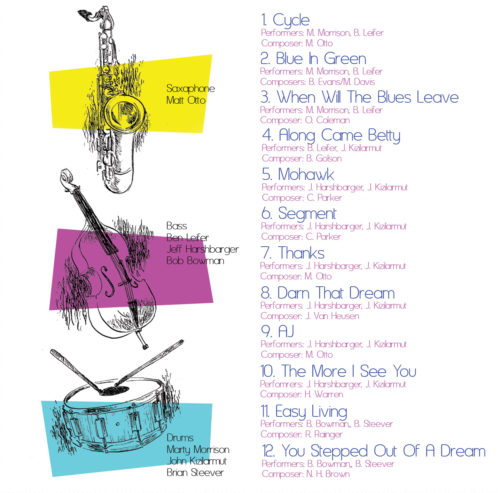This recent CD is my first standards album. As jazz musicians we arguably spend most of our time improvising over the jazz cannon; old show tunes and jazz pieces written by our mentors and heroes. This album is a collection of some of my favorite songs to play and improvise over. There are also three original pieces; the song “Thanks” which I wrote for my father and stepfather who both passed in the last few years and two contrafacts; Cycle over Cyclic Episode by Sam Rivers and AJ over Yardbird Suite by Charlie Parker. I’m really happy with how these live recordings captured my voice as an improvisor and my personal taste; which I consider to be a meld of melodic singing, harmonic/rhythmic playing and the free or avant-guard.
Review from Stereophile by Thomas Conrad:
Matt Otto: Kansas City Trio
Otto, tenor saxophone; Jeff Harshbarger, Ben Leifer, Bob Bowman, bass; John Kizilarmut, Marty Morrison, Brian Steever, drums
JCR 63023 (CD). 2023. Otto, prod.; Chad Meise, Duane Trower, engs.
Performance ****
Sonics ****½
Matt Otto has led a substantial jazz life. He holds BFA and MFA degrees and teaches at the University of Kansas. He has worked with a long list of the best living jazz players, has appeared on more than 50 albums, and is respected by his peers. He has never gotten rich or famous. Musicians like Otto keep the art form alive.
Otto has developed a distinctive tenor saxophone identity. His sound tends toward the light, his language toward the oblique and the understated. His approach makes him challenging but rewarding. His proprietary logic keeps surprising you with fresh lyricism.
The predecessor Otto most resembles is Warne Marsh. Like Marsh, Otto forms thoughts in long lines and deemphasizes rhythmic accents. Like Marsh, Otto is a vertical improviser; his creative process is centered on harmony and chords as an entrée to melody.
Kansas City Trio is a saxophone trio album with three bassists and three drummers. Inside its stark musical environment, Otto undertakes a very nonstandard program of standards. “Easy Living” is only intermittently recognizable, not because Otto is not thinking of the melody but because he is such an original thinker. His phrasing makes it almost a new tune. “You Stepped Out of a Dream” is used as a form to stimulate improvisation, with occasional references to the song’s historical romantic associations. “Darn That Dream” has a long, freeform introduction; only at the end does it acknowledge fragments of the melody. “Blue in Green” retains much of its original introspection and pensiveness but takes on a new allure that only happens when a great song is rendered in the rich, sensual sonorities of a tenor saxophone in the right hands.—Thomas Conrad


Here’s a link to the Band Camp page if you’d like to listen to or support the project:
https://mattotto.bandcamp.com/album/kansas-city-trio
KCUR (NPR) Interview for the new Trio album: Click here.
The Pitch Magazine Interview: Click here.
Pre-release article in OCCHIMag Magazine: Click here.
Here’s a video from the studio session of Thanks.
Liner Notes: Matt Otto, Kansas City Trio
Matt Otto has recorded on well over fifty albums–each one a snapshot of his continuing and deepening relationship with improvised music for the past three decades, a remarkable span chronicling his inexorable metamorphosis from young, free-jazz firebrand to poet, sage and mentor, one who has earnestly and methodically followed an unwavering path to discovering his own musical ideals and artistic identity. It is only at this stage of his career that he found it was the right time to make an album of jazz standards.
Not that playing tunes is anything new to Otto; in fact, it’s probably the thing he loves to do the most. He would not be alone in that sentiment. The Great American Songbook owes a debt of gratitude for its perpetuation into the 21st century to the multitudes of jazz musicians who throughout history have continued to learn and perform those works that have outlived their creators, rendering both compositions and authors immortal for the foreseeable future. “I would hope that the composers would enjoy our renditions or at the very least give us a nod,” says Otto.
It’s a fair consideration, and certainly not a given, for the standards have endured from the lasting power of those who recorded their definitive versions. Hawkins, Webster, Young, Parker, Gordon, Mobley, Coltrane, Rollins, Desmond, Stitt, Cannonball, Konitz, Henderson–just the saxophonists alone in jazz’s hallowed history have unlocked the potential of these tunes well beyond their Tin Pan Alley origins. Would George Gershwin, who died in 1937, have appreciated Parker’s flighty treatment of “Embraceable You,” or Coltrane’s added-chord reharmonization of “But Not For Me?”
The reason why these tunes have remained compelling to jazz artists is that their melodic and harmonic structures were both foundational and unique enough to withstand the remodeling of additional architecture within and around them. Each great artist found new colors to paint on these evergreen songs, and as time marches forward, that task becomes more difficult to achieve. Any current jazz musician should know that this is the standard they will be held to should they choose to accept the challenge, and that their results will be judged in comparison to those who came before.
Of course, for the aspiring artist, the learning of jazz is not achieved through outcomes, but in process, something Otto has dedicated his life to. “I’d imagine I have a fairly common life as a musician,” he says. “I work on music everyday by writing, playing, singing, listening, studying and teaching. I enjoy the process of learning, growing and sharing the music which even at my age is still very gratifying, mystifying and challenging.” And what does he continue to strive for? “Connecting with my mind’s voice, my singing voice, is always both my goal and my challenge,” he explains. “Trying to subordinate my intellect to my ear without abandoning it entirely while focusing on both listening to and feeling the other players consistently throughout my improvised line.” Otto has, throughout most of his career, pursued a very pure and noble path in music: to find instantaneous inspiration from a comprehension that can only be achieved through a lifetime of study, revealed in full in his exploration of this well-traveled repertoire. “I feel that I’m slowly coming upon my own voice and approach to these classic tunes,” he says.
Otto, through his perpetual fascination with and thorough absorption of jazz harmony, has long been at a place where he neither needs nor often wants a harmonic accompaniment for his own projects. So, it is only fitting he has utilized the traditional saxophone trio format—drums and bass only—for this presentation of standards, making the same decision as a number of the aforementioned saxophonists (along with many others) for their own projects. Otto has drawn from a deep well of talented bassists and drummers to play with, all friends of his, he notes. “They all share a humble empathetic quality that they bring to the music that reminds me how to play, listen and create.” Though almost all the tunes are quite old, their treatments of them trend toward a modernist approach, be it the unusual, sinister bass ostinato figure on Charlie Parker’s “Segment,” or the reductionist D minor drone intro on Miles Davis’ “Blue in Green,” allowing Otto to overlay the entire melody, using the shifting modal implications as an impetus to delve further into non-diatonicism. Other times, the tunes are played in their original forms, sometimes without the melody at the outset, allowing for Otto’s improvisation to fashion a gradient from abstraction to clarity when the head is finally revealed.
The tempos throughout range from quite slow to medium briskness, reflecting Otto’s penchant to not be in such a hurry. But it would be folly to assume lack of beats per minute equates to a lack of intensity or zeal. Every phrase travels lyrically to what seems to be the best resolution, with a relentless development increasing the pressure and tension ever so methodically. Like the proverbial frog in the pot on the stove who fails to realize its surroundings have been superheated until it’s too late, the fire comes to those who wait.
“Bird” is a dish served quite often here. In addition to Segment, Otto plays a blues by the famous saxophonist, “Mohawk,” in a much looser, almost free-jazz spirit. For the track, “AJ,” he wrote a contrafact—an alternate melody—to the harmony of a third Parker piece, “Yardbird Suite.” Many of Otto’s own compositions are derived from standards. “I really enjoy writing melodies over forms and progressions I’m familiar with,” he acknowledges, adding, “I rarely learn my own tunes as well as the standards I grew up playing, so writing an original over old song forms is easier, and the improvising comes second nature.” His innate lyricism shines through on “Cycle,” based on “Cyclic Episode” by saxophonist Sam Rivers, unifying the rapidly shifting harmonies with a rhapsodic melody that perhaps even a child would be able to remember and sing along to.
There is the inclusion of one new composition penned by Otto that owes no inspiration from any standard tune, but rather from his father, Walt, and his stepfather, Bruce, both of whom tragically passed away within a year of each other, and not long before the recording of this album. “The experience has been the most difficult thing I’ve dealt with in my short life,” says Otto, who at age 56, is admitting a hopeful truth–that he has many more years ahead of him to realize his life and musical goals. “Thanks” is dedicated to both of his fathers in gratitude for the support they gave Otto as he forged forward as an artist, in honor of their memory as they continue to inspire his ongoing journey to that end.
-Gary Fukushima, 2023
